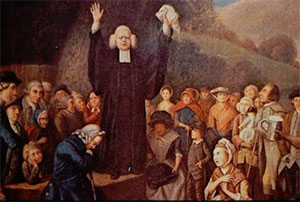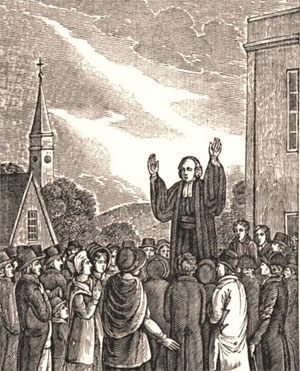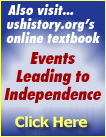
The Declaration of Independence
Lesson Plan
The First Great Awakening
- What accounted for the tremendous appeal of the Great Awakening to colonists in the later half of the 1700’s and who were some of the leaders of that movement?
- What was the connection between colonists making important choices about fundamental religious beliefs and loyalties and making important choices about basic political beliefs and loyalties?
- What were some of the major consequences of the Great Awakening that impacted the philosophical convictions of colonists?

George Whitefield
From the time of the Reformation, scholars and philosophers in Europe debated important issues of theology and faith. The Reformation had made a big impact on society because it explored views beyond that of the Catholic Church. One of the core beliefs of the Reformation was that scripture should be the guide for one's life. Central to that belief is that the final interpretation of Scripture is one's own interpretation, not a church father's or anyone else. Still another core belief of Protestantism is that God's covenant (that is, the mutual promises between God and one who believes in him) is based on the consent of that individual.
Diverse Protestant groups were gaining membership as various groups tried to define what they felt was the truest form of Christianity. One of these groups was the Puritans. A group of radical Puritans who called themselves "Pilgrims" came to the New World to begin a radical new society that revolved around their beliefs. In fact, groups seeking to promote their own interpretation of Christian morality started all of the first settlements in New England. There were some differences, but basic Protestant convictions guided behavior in most colonies and formed the glue for early colonial society.
By the beginning of the 18th century, however, this fiery religious spirit died down. The descendents of the initial settlers began to generate wealth. Communities flourished and the sense of distinct religious identity diminished. Christian belief was under attack as more rational thinking became popular. In Europe, the Enlightenment was flourishing and a belief called Deism was becoming popular. Deism is a religious philosophy that a Supreme Being created the universe, but that any religious truth can be proven through reason. It focuses on the observation of the natural world, without the need for faith or organized religion. Beliefs about religion were starting to change again. Then came the "Great Awakening."
The First Great Awakening was a period when spirituality and religious devotion were revived. This feeling swept through the American colonies between the 1730s and 1770s. The revival of Protestant beliefs was part of a much broader movement that was taking place in England, Scotland, and Germany at that time. Many different preachers spoke the message that being truly religious meant repenting (confessing sins) and devoting oneself to God. The movement was popular in Europe, but even more popular in the American colonies. Tens of thousands of non-religious colonists were converted to Protestant beliefs. This had a huge impact on church attendance, homes, workplaces, entertainment, and colleges.
In New England, Reverend Jonathan Edwards preached about the need to repent and be converted. People flocked to listen to him, and many consider Edwards to be America's most important and original theologian. He was also a major leader in colonial life. Edwards went on to become the third president of Princeton University. Early graduates of Princeton were important leaders including James Madison, and Aaron Burr, who famously dueled Alexander Hamilton and was Thomas Jefferson's Vice President.
In the Middle Colonies, Gilbert Tennent was an early leader in the Awakening. His father William was a Presbyterian minister who started the famous religious school known as Log College. Their graduates would help to develop Princeton. Interestingly, the Awakening was a reaction against rationalism, but it also led to the founding of a number of colleges. Many universities other than Princeton were founded then, including Brown, Dartmouth, and Rutgers.

George Whitefield
George Whitefield, however, was the most electrifying figure of the era. Whitefield was an Anglican priest who lost favor in England. After he was expelled from preaching in England, he began to preach in the farmers' fields to crowds of thousands. When he came to the American colonies, he brought the same energy with him. Whitefield was an actor by training, and he delivered emotional sermons where he would shout, weep, and tremble as he spoke of God. Colonists gathered by the thousands to hear him speak. He travelled from New England to Georgia and is considered by many to be the founder of the evangelical movement in America. He was so loved by his followers that during the Revolutionary War, his body was dug up so that soldiers could take scraps of his clothing. They believed that if they did this, God would watch over them. Whitefield converted slaves and some Native Americans to Christianity. Even Benjamin Franklin, who was a religious skeptic, became Whitefield's good friend and printed many of his sermons. Franklin once emptied his coin purse after hearing him speak in Philadelphia.
The First Great Awakening divided many American colonists. On the one hand, it was an experience that created unity between the colonies. It led to a shared awareness of being American because it was the first major, "national" event that all the colonies experienced. On the other hand, it also caused division between New Lights, who embraced it, and Old Lights, who preferred old-fashioned ways. It also split the Presbyterian denomination in half. Because there were conflicts and divisions, the movement was in decline by the mid-1740s. Fortunately, the more unifying effects remained for decades. And despite the conflict, one surprising result was greater religious tolerance. With so many new denominations, it was clear that no one religion would dominate any region.
The spirit of the First Great Awakening helped to encourage the Revolutionary spirit. Many things had changed, and many powers shifted. Before, ministers were almost treated like aristocrats. Most new ministers connected with common people. They were not always ordained, and sometimes showed less (not more) respect for those above their social class. Most of all, the new denominations of Christianity were much more democratic. The overall message was one of greater equality.
So the First Great Awakening paved the way for independence and the Constitution. Speaking about spiritual equality encouraged colonists to think more about the need for democracy in both church and state. The reformation principal that God's covenant with has church was based on voluntary consent and that his covenant is a participatory relationship would be expanded into political philosophy and general feelings about authority. As Locke and other great thinkers of this era had suggested, the people became seen as leaders, not the monarchs and aristocrats. These ideas would take time to take hold, and tolerance would continue to be a challenge. But soon enough, the Founding Fathers would be able to put this all in writing, and the war would rage.
"The Great Awakening" went viral... People like Whitefield and Edwards were like rock stars. Why do you think the Great Awakening went viral?
Studying about the Great Awakening has put many students to sleep. Give two good reasons why they might want to stay awake!
- What accounted for the tremendous appeal of the Great Awakening to colonists in the later half of the 1700’s and who were some of the leaders of that movement?
- What was the connection between colonists making important choices about fundamental religious beliefs and loyalties and making important choices about basic political beliefs and loyalties?
- What were some of the major consequences of the Great Awakening that impacted the philosophical convictions of colonists?
Start page | The Document | A Reading Signers | Related Information | Jefferson's Account | Declaration House | Declaration Timeline | Rev. War Timeline | More Resources | Lesson Plan |




